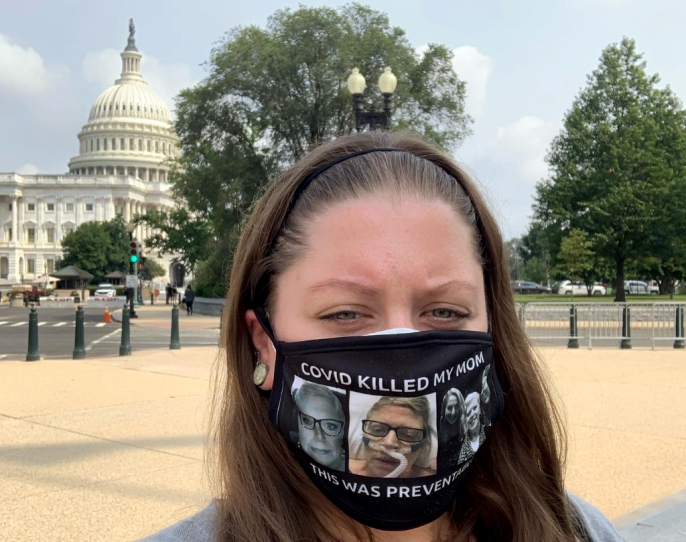Updated at 1:55 p.m. Dec. 1
Jennifer Ritz Sullivan placed a ceramic figure on her living room shelf of St. Nick riding a bike and towing a tree. It was one of the many festive Santas her mother used to collect and display year-round. Her mother, Earla Dawn Dimitriadis, died almost a year ago of coronavirus at the age of 66.
“It’s surreal to me that my mother is gone in such a traumatic way that’s still being debated,” said Ritz Sullivan in a Zoom interview. Dimitriadis was infected by someone close to her who didn’t take the pandemic seriously and listened to former President Donald Trump downplaying the severity of the virus.
More Local News
Ritz Sullivan and other Massachusetts residents who lost family members to the deadly virus have found shared resilience by joining Marked by Covid, a national nonprofit seeking to elevate the stories of those impacted by the virus. In Massachusetts, that means fighting for a bill on Beacon Hill to create a statewide COVID-19 Remembrance Day.
The proposed day, on the first Monday of March, aims to memorialize those who lost their lives, to heed the suffering of COVID-19 survivors and to recognize the efforts of volunteers and essential workers.
The bill is backed in Massachusetts by Reps. Natalie M. Blais (D-Sunderland) and Mindy Domb (D-Amherst), who filed the legislation on Beacon Hill in September .
“It’s not prescriptive in terms of how it happens or how people should observe the day,” Blais said. “It does provide them the space to do it though. And that was really important to us.”

The state bill is similar to one proposed by Sens. Elizabeth Warren and Ed Markey at the federal level. Both bills would mark the same day for the memorial.
The Massachusetts measure must be reported favorably out of the Special Joint Committee on State Administration and Regulatory Oversight by Feb. 2, through Ways and Means and onto the House floor for a vote. It would require approval from Gov. Charlie Baker, who has not indicated whether he will support it. “The Administration will carefully review any legislation that reaches the Governor’s desk,” wrote a spokesman in an emailed message.
But the bipartisan support for the bill gives activists hope, with Republicans such as House Minority Leader Brad Jones and Rep. Hannah Kane of Worcester co-sponsoring the bill. Desire James Versailles wants to ensure that there is a day each year to remember his mother and others like her. Florcie Yves Chavannes Versailles died of coronavirus in a Braintree nursing home on May 30, 2020, at the age of 78.
Chavannes Versailles, a Black Haitian immigrant, moved to Boston in 1968, and was a longtime affordable housing activist and resident with the Tent City Housing Complex . Her son recounted her organizing toe-to-toe with Mel King and working at Rosie’s Place, a women’s shelter in the South End, to feed disadvantaged residents. He’s disappointed that after all she gave to her community, she was short-changed in her death.
“I feel that my mom didn’t have the same level of care and treatment that she should have as a woman of color. And it’s disappointing to ... wrap my head around that. And to say it as well,” he told GBH News.

Black and brown communities have been disproportionately impacted by the pandemic. Versailles thinks a Remembrance Day is a step toward honoring them, and he’s met with state and federal legislators to lobby for it.
The bill has gained support from medical professionals, too.
“COVID-19 Remembrance Day is important to not only help us honor those we have lost but to also serve as a reminder of why we need to work together to build resilience against future threats from novel infections,” wrote Dr. Nahid Bhadelia, a Boston-area infectious diseases physician in written testimony to the Legislature. She said health care workers witnessed the devastation firsthand and saw the ripple effects of the public health emergency in communities and homes. And they need to be remembered too.
Remembering can be an exercise of pain. Ritz Sullivan recounted her final conversation with her mom. Dimitriadis had been posting her journey on Facebook, but that day, she sounded nothing like herself and was gasping for air.
“It’s a sound I’ll never forget,” Ritz Sullivan said.
She tries to think of happy things, like her mom’s love of Halloween and how she volunteered to help women surviving domestic abuse.
“My mother, after all she endured throughout her life, died due to the government mishandling and their failures of the pandemic — she shouldn’t have gone out that way,” said Ritz Sullivan. She’s hoping that the Remembrance Day will pay the proper homage, and remind naysayers — those who accuse her of being a crisis actor or tell her online that the virus isn’t real — that the pandemic is still very present in people’s lives.
Clarification: This story was updated to correct a detail of the federal bill. Like the state bill, the federal measure explicitly recognizes essential workers.








